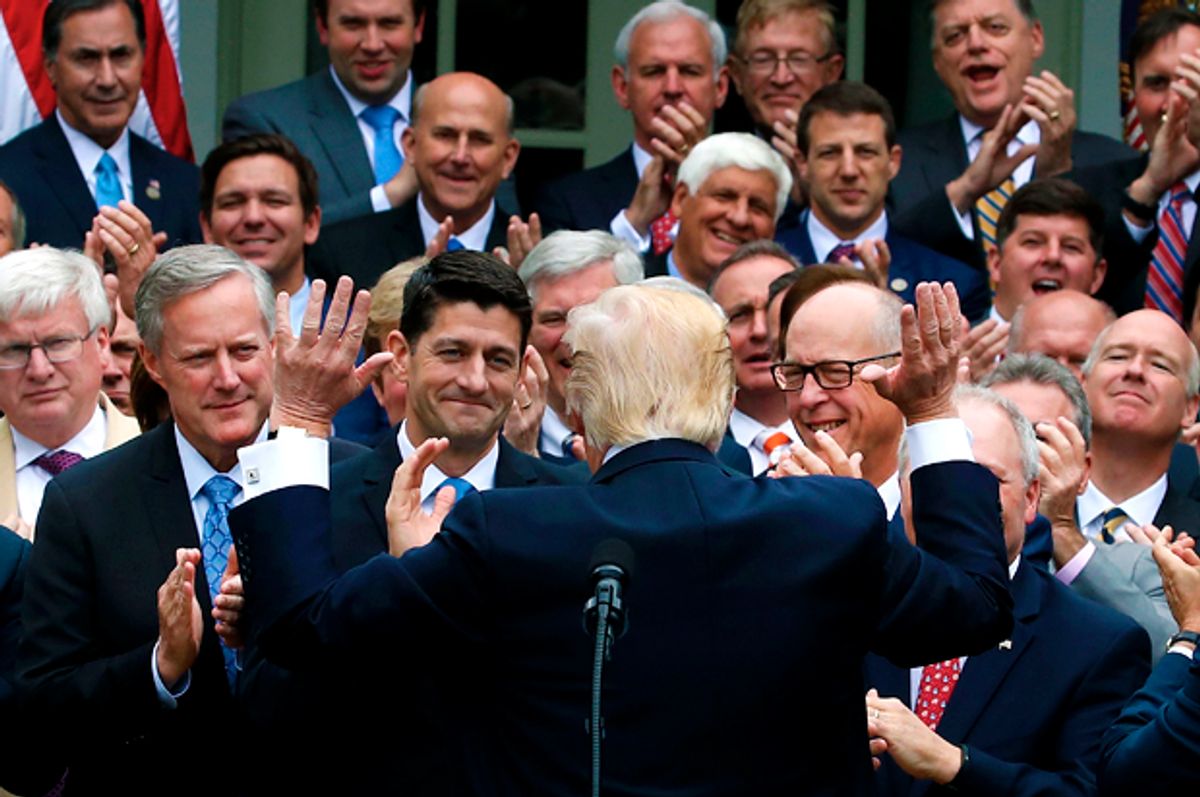The vast inequality that's rending our society is not a natural, inevitable or accidental phenomenon; it's caused intentionally by policy decisions that corporate and political officials make, often in tandem.
Every now and then, we commoners get a glimpse of inequality in the making, as we did recently when the GOP boss of the House, Rep. Paul Ryan rammed the awful Trumpcare bill through that chamber. Without allowing any public testimony or even getting an analysis of its cost, Ryan browbeat and cajoled the Republican majority to hold their noses and pass this gob of plutocratic wretchedness. Their bill was so bad that, at most, a mere 17 percent of Americans support it.
The public's distaste for Trumpcare is well-deserved, for it's an inequality machine: It strips at least 23 million people of health coverage; it lets insurance corporations either refuse to cover people with pre-existing conditions or to gouge them with extreme price increases. And it lets states eliminate the requirement that insurance policies must at least cover such essential health needs as cancer treatment and maternity care.
And in a flagrant example of directly widening inequality in America, the Republicans' bill slashes $880 billion out of the Medicaid budget, which provides health care for the poor, elderly individuals and people with disabilities. That's not just a cut in dollars, but in people — 14 million needy families would lose their access to health care.
But that's only the half of it. Ryan's Trumpcare nastiness also gives a massive new tax cut to health care corporations and wealthy investors. How massive is the cut? Precisely $880 billion.
By taking from the needy and giving to the rich, this one deliberate act by Congress would further widen economic disparity in our country by nearly $1.8 trillion. That is one surefire way that inequality happens.
Another way to ensure economic inequality by taking from the needy and giving to the rich is through God-awful trade deals like the North American Free Trade Agreement. Trump gloriously pledged last year to scrap the NAFTA trade scam and renegotiate it to provide a "much better" deal for working families. Beautiful! But like rose blossoms, a politician's promises can be beautiful when they burst into full, glorious bloom — only later to have them fade over time and, petal by petal, fall away.
This particular blossom was the single most important issue that convinced many hard-hit, former factory workers to vote Trump into the White House. But the bloom is now off Trump's rosy promise, and it looks like working families are getting nothing but more free-trade thorns from him. As revealed in a recently leaked copy of his NAFTA renegotiation plan, far from scrapping the U.S.-Mexico-Canada trade deal, White House negotiators are goosing it up with even more power for multinational corporations. In particular, the plan includes new "investor incentives" to offshore thousands more of our middle-class jobs. Where did this come from? It seems to have been lifted right out of last year's discredited and defeated Trans-Pacific Partnership, a scam intended to enthrone corporate supremacy over people and even our laws.
Indeed, the 500 corporate executives and lobbyists who essentially wrote the raw TPP deal and tried to ram it down our throats, have quietly been huddling with Trump's team to draft the plan for this "new" NAFTA. Where were representatives of those working people Trump promised to help? Locked out, not even allowed to watch the negotiations, much less have a say in them. The same for consumers, environmentalists, farmers — even members of Congress are being left totally in the dark and allowed no voice in shaping the deal.
But I'm guessing that the Goldman Sachs executives Trump brought in to run our economic policy have a say, along with his daughter and son-in-law who oversee both our government and stand to benefit from the extended Trump family's global business empire. With all of them and that slew of corporate lobbyists at the table, you, me and everyone else are on the menu. And the inequality gap will continue to grow.



Shares